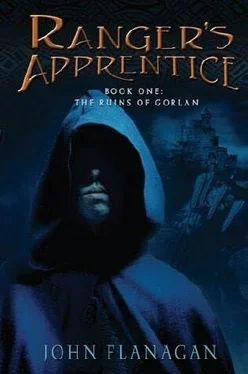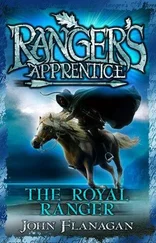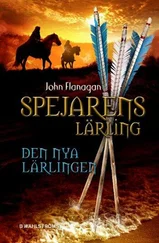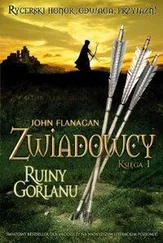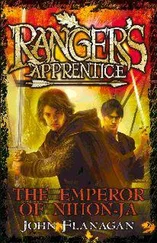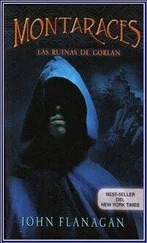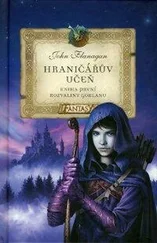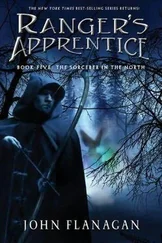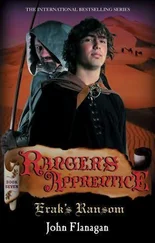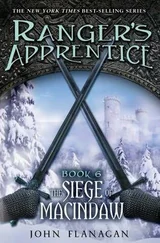John Flanagan - The Ruins of Gorlan
Здесь есть возможность читать онлайн «John Flanagan - The Ruins of Gorlan» весь текст электронной книги совершенно бесплатно (целиком полную версию без сокращений). В некоторых случаях можно слушать аудио, скачать через торрент в формате fb2 и присутствует краткое содержание. Жанр: Фэнтези, на английском языке. Описание произведения, (предисловие) а так же отзывы посетителей доступны на портале библиотеки ЛибКат.
- Название:The Ruins of Gorlan
- Автор:
- Жанр:
- Год:неизвестен
- ISBN:нет данных
- Рейтинг книги:3 / 5. Голосов: 1
-
Избранное:Добавить в избранное
- Отзывы:
-
Ваша оценка:
- 60
- 1
- 2
- 3
- 4
- 5
The Ruins of Gorlan: краткое содержание, описание и аннотация
Предлагаем к чтению аннотацию, описание, краткое содержание или предисловие (зависит от того, что написал сам автор книги «The Ruins of Gorlan»). Если вы не нашли необходимую информацию о книге — напишите в комментариях, мы постараемся отыскать её.
The Ruins of Gorlan — читать онлайн бесплатно полную книгу (весь текст) целиком
Ниже представлен текст книги, разбитый по страницам. Система сохранения места последней прочитанной страницы, позволяет с удобством читать онлайн бесплатно книгу «The Ruins of Gorlan», без необходимости каждый раз заново искать на чём Вы остановились. Поставьте закладку, и сможете в любой момент перейти на страницу, на которой закончили чтение.
Интервал:
Закладка:
Whack!
The heavy bowstring slapped into the soft flesh on the inside of his arm, stinging like a whip. Will yelled with pain and dropped the bow as if it were red-hot.
Already, a thick red welt was forming on his arm. It throbbed painfully. Will had no idea where the arrow had gone. Nor did he care.
"That hurt!" he said, looking accusingly at the Ranger. Halt shrugged.
"You're always in a hurry, youngster," he said. "That may teach you to wait a little next time." He bent to the bundle and pulled out a long cuff made of stiff leather. He slid it onto Will's left arm so that it would protect him from the bowstring. Ruefully, Will noticed that Halt was wearing a similar cuff. Even more ruefully, he realized that he'd noticed this before, but never wondered about the reason for it.
"Now try it again," said Halt.
Will chose another arrow and placed it on the string. As he went to draw it back again, Halt stopped him.
"Not with the thumb and finger," he said. "Let the arrow rest between the first and second fingers on the string… like this." He showed Will how the nock – the notch at the butt end of the arrow – actually clipped to the string and held the arrow in place. Then he demonstrated how to let the string rest on the first joint of the first, second and third fingers, with the first finger above the nock point and the others below it. Finally, he showed him how to allow the string to slip loose so that the arrow was released.
"That's better," he said and, as Will brought the arrow back, continued, "Try to use your back muscles, not just your arms. Feel as if you're pushing your shoulder blades together…" Will tried it and the bow seemed to draw a little easier. He found he could hold it steadier than before.
He fired again. This time, he just missed the tree trunk he'd been aiming for.
"You need to practice," said Halt. "Put it down for now" Carefully, Will laid the bow down on the ground. He was eager now to see what Halt would produce next from the bundle.
"These are a Ranger's knives," said Halt. He handed Will a double scabbard, like the one he wore on the left-hand side of his own belt.
Will took the double scabbard and examined it. The knives were set one above the other. The top knife was the shorter of the two. It had a thick, heavy grip made of a series of leather discs set one above the other. There was a brass crosspiece between the hilt and the blade and it had a matching brass pommel.
"Take it out," said Halt. "Do it carefully." Will slid the short knife from the scabbard. It was an unusual shape. Narrow at the hilt, it tapered out sharply, becoming thicker and wider for three quarters of its length to form a broad blade with the weight concentrated toward the tip, then a steep reverse taper created a razor-sharp point. He looked curiously at Halt.
"It's for throwing," said the Ranger. "The extra width at the tip balances the weight of the hilt. And the combined weight of the two helps drive the knife home when you throw it. Watch." His hand moved smoothly and swiftly to the broad-bladed knife at his own waist. He flicked it free from the scabbard and, in one smooth action, sent it spinning toward a nearby tree.
The knife thudded home into the wood with a satisfying thock!
Will looked at Halt, impressed with the Ranger's skill and speed. "How do you learn to do that?" he asked.
Halt looked at him. "Practice." He gestured for Will to inspect the second knife.
This one was longer. The handle was the same leather disc construction, and there was a short, sturdy crosspiece. The blade was heavy and straight, razor-sharp on one side, thick and heavy on the other.
"This is in case your enemy gets to close quarters," said Halt. "Although if you're any sort of an archer, he never will. It's balanced for throwing, but you can also block a sword stroke with that blade. It's made by the finest steelsmiths in the kingdom. Look after it and keep it sharp."
"I will," the apprentice said softly, admiring the knife in his hands. "It's similar to what the Skandians call a saxe knife," Halt told him. Will frowned at the unfamiliar name and Halt went on to explain further.
"It's both weapon and tool – a sea ax, originally. But over the years the words sort of slid together to become saxe. Mind you," he added, "the quality of the steel in ours is a long way superior to the Skandian ones." Will studied the knife more closely, seeing the faint blue tint in the blade, feeling the perfect balance. With its leather and brass hilt, the knife might be plain and functional in appearance. But it was a fine weapon and, Will realized, far superior to the comparatively clumsy swords worn by castle Redmont's warriors.
Halt showed him how to strap the double scabbard to his belt so that his hand fell naturally to the knife hilts. "Now," he said, "all you have to do is learn to use them. And you know what that means, don't you?" Will nodded his head, grinning. "A lot of practice," he said.
Chapter 11
Sir Rodney leaned on the timber fence surrounding the practice area as he watched the new Battleschool cadets going through their weapons drill. He rubbed his chin thoughtfully, his eyes scanning the twenty new recruits, but always returning to one in particular – the broad-shouldered, tall boy from the Ward, whom Rodney had selected at the Choosing. He thought for a moment, searching for the boy's name.
Horace. That was it.
The drill was a standard format. Each boy, wearing a chain mail shirt and helmet and carrying a shield, stood before a padded hardwood post the height of a man. There was no point practicing sword work unless you were burdened with shield, helmet and armor, as would be the case in a battle, Rodney believed. He thought it was best that the boys became used to the restrictions of the armor and weight of the equipment right from the start.
In addition to shield, helmet and mail, each boy also held a drill sword issued by the armorer. The drill swords were made of wood and bore little resemblance to a real sword, aside from the leatherbound hilt and crosspiece on each. In fact, they were long batons, made of seasoned, hardened hickory. But they weighed much the same as a slender steel blade, and the hilts were weighted to approximate the heft and balance of a real sword.
Eventually, the recruits would progress to drilling with actual swords – albeit with blunted edges and points. But that was still some months away, by which time the less suitable recruits would have been weeded out. It was quite normal for at least a third of the Battleschool applicants to drop out of the harsh training in the first three months. Sometimes it was the boy's choice. For others, it was at the discretion of his instructors or, in extreme cases, Sir Rodney himself. Battleschool was harsh and standards were strict.
The practice yard rang with the thudding of wood against the thick, sun-hardened leather padding on the practice posts. At the head of the yard, drillmaster Sir Karel called the standard strokes that were being practiced.
Five third-year cadets, under the direction of Sir Morton, an assistant drill instructor, moved among the boys, attending to the detail of the basic sword strokes: correcting a wrong movement here, changing the angle of a stroke there, making sure another boy's shield wasn't dropping too far as he struck.
It was boring, repetitive work under the hot afternoon sun. But it was necessary. These were the basic moves by which these boys might well live or die at some later date and it was vital that they should be so totally ingrained as to be instinctive.
It was that thought that had Rodney watching Horace now. As Karel called the basic cadence, Rodney had noticed that Horace was adding an occasional stroke to the sequence, and yet managing to do so without falling behind in his timing.
Читать дальшеИнтервал:
Закладка:
Похожие книги на «The Ruins of Gorlan»
Представляем Вашему вниманию похожие книги на «The Ruins of Gorlan» списком для выбора. Мы отобрали схожую по названию и смыслу литературу в надежде предоставить читателям больше вариантов отыскать новые, интересные, ещё непрочитанные произведения.
Обсуждение, отзывы о книге «The Ruins of Gorlan» и просто собственные мнения читателей. Оставьте ваши комментарии, напишите, что Вы думаете о произведении, его смысле или главных героях. Укажите что конкретно понравилось, а что нет, и почему Вы так считаете.
